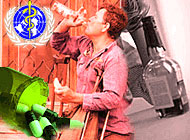Swiss experts present views on youth drinking

An international conference aimed at drawing up a plan of action to stem the increasing trend of excess alcohol consumption in youngsters is underway in Stockholm. Switzerland is one of the countries taking part.
Organised by the Geneva-based World Health Organisation (WHO), the three-day meeting brings together delegates from numerous European member nations.
The WHO says the issue of increasing alcohol abuse by youngsters is the most alarming in Europe.
The number of Swiss teenagers and people in their early 20s who indulge in “binge drinking” (consuming excessive amounts of alcohol usually at weekends) has increased significantly over the last decade.
The main danger posed by the youngsters’ irresponsible alcohol consumption is car accidents. Currently, police can only stop someone and test the alcohol levels in their bloodstream if they have reason to be suspicious.
Legislation is, however, being prepared in Switzerland that will soon allow random breathalyser tests.
Richard Müller, director of the Swiss Institute for the Prevention of Alcohol and Drug Addiction welcomes the move: “This is an important step we are taking, because accidents are the main cause of deaths in Switzerland and one of the main ways to improve the health of the country is to reduce the amount of alcohol abuse in youngsters.”
The authorities say the phenomenon of binge drinking, as with that of cannabis smoking, is a form of escapism.
“School life nowadays is very hard in Switzerland and students have to fight a lot to achieve in life. They feel insecure about their professional future and therefore live very much for the here and now,” said Müller .
The Swiss health authorities want to implement programmes like the “Designated Driver” campaign in the United States – where groups of friends take turns in abstaining from drinking and drive their friends home safely.
They also want to unify cantonal laws on age-limits on sales of wine and beer – which unlike spirits do not come under national legislation.
“It is forbidden to sell spirits and ‘alcopops’ (alcohol mixed with sweet, fizzy drinks) to anyone under the age of 18 throughout the country, but different cantons have different rules regarding wine and beer,” explained Anne-Rose Barth of the Federal Health Office.
“The general age limit is 16, but there are places with a lower limit,” she added.
The Swiss delegation in Stockholm will be seeking to exchanging experiences with colleagues from countries with similar problems.
Among the participant countries is Italy, which until recently prided itself on its youngsters having a traditionally healthy approach to alcohol because wine is so much a part of the culture. Now, Italy is also facing an alarming increase in the numbers of young heavy drinkers.
by Juliet Linley

In compliance with the JTI standards
More: SWI swissinfo.ch certified by the Journalism Trust Initiative
You can find an overview of ongoing debates with our journalists here . Please join us!
If you want to start a conversation about a topic raised in this article or want to report factual errors, email us at english@swissinfo.ch.